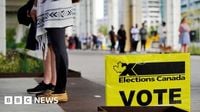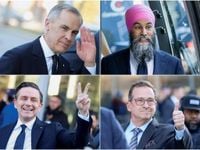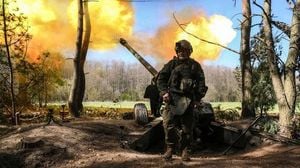Millions of Canadians are heading to the polls today, April 28, 2025, for the 45th general election, a snap election called just five weeks ago. The election is not only significant for its timing but also for the pressing issues at stake, particularly concerning the relationship with the United States. Prime Minister Mark Carney, who took over from Justin Trudeau last month, is facing off against Conservative leader Pierre Poilievre in a contest that has garnered attention due to U.S. President Donald Trump's threats of tariffs and his provocative suggestion to make Canada the 51st state.
The election was called on March 23, 2025, and has seen a record turnout in early voting, with an estimated 7.3 million Canadians casting their ballots during advance polls over the Easter long weekend, according to Elections Canada. This unprecedented participation reflects the electorate's engagement with the issues at hand.
As Canadians prepare to vote, it is essential to understand the voting process. To be eligible, voters must be Canadian citizens, at least 18 years old on election day, and able to prove their identity and address. Each voter is assigned a specific polling station, where they must cast their vote.
Polling hours vary across the country. In Nunavut, polling stations are open from 9:30 a.m. to 9:30 p.m. ET, while in the Northwest Territories (N.W.T.), they operate from 7:30 a.m. to 7:30 p.m. MT. In the Yukon, polls are open from 7 a.m. to 7 p.m. YT. It's worth noting that peak voting times usually occur early in the morning and after 4 p.m., making the midday hours the best time for shorter wait times.
According to Elections Canada, all electors still in line at the end of voting hours will be allowed to vote, ensuring that no one is disenfranchised.
As the polls close, the counting of ballots will commence. This process is designed to be transparent, secure, and auditable. Preliminary results are expected to come in late on Monday night or early Tuesday morning, with news outlets, including the CBC, providing updates throughout the evening.
The election is crucial not only for the immediate future of Canadian politics but also for the long-term implications of the relationship with the U.S. Carney's government has been criticized for its approach to Trump's administration, and how the candidates respond to these challenges will likely influence the election's outcome.
In terms of parliamentary representation, when Canada's Parliament was dissolved last month, the Liberals held 152 seats, while the Conservatives had 120. Other parties, including the Bloc Québécois (33 seats), the New Democratic Party (24 seats), and the Green Party (2 seats), also play significant roles in shaping the political landscape.
Mark Carney's leadership has been under scrutiny since he took office, and he asserts that his experience as a central banker during economic upheaval makes him the ideal candidate to confront Trump. His main opponent, Pierre Poilievre, is also vying for the support of undecided voters, particularly in key battlegrounds like Ontario and Quebec, which together account for 200 of the 343 seats in Parliament.
As Canadians cast their votes, many are looking to see how the election will impact their communities and the nation as a whole. The results will be closely monitored, especially in pivotal regions like the "905" area around Toronto, known for its competitive races between the Liberals and Conservatives. Carney is running in Nepean, while Poilievre seeks to hold his seat in Carleton.
If no party wins a majority, the leader of the party with the most elected members typically forms a government. This scenario could lead to a minority government, requiring collaboration with other parties to pass legislation. The stakes are high, and the outcome of this election could shape Canada's political direction for years to come.
For those eager to follow the election results, CBC platforms will begin coverage at 6:30 p.m. ET, providing insights as ballots are counted and the political landscape begins to take shape. The first polls will close in Newfoundland and Labrador at 7:00 p.m. EDT, while the last polls in British Columbia will close at 10:00 p.m. EDT.
As Canadians engage in this democratic process, the anticipation surrounding the election results reflects the deep-seated desire for a government that aligns with their values and addresses their concerns. The outcome will not only determine the future of the current administration but also set the tone for Canada’s relationship with its southern neighbor and the global community.
In summary, today’s election represents a pivotal moment in Canadian politics, with millions of voters participating in a crucial decision that will impact the nation’s trajectory. As the polls close and the counting begins, Canadians await the results that will shape their future.





